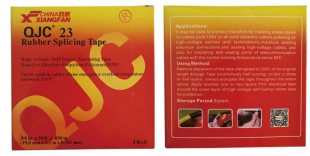The Importance of PVC Tape for Electrical Insulation
In today's world where electrical devices are ubiquitous, ensuring the safety and reliability of electrical systems is more crucial than ever. One of the most effective and widely used materials for achieving electrical insulation is PVC (Polyvinyl Chloride) tape. This versatile product has proven essential for both professional electricians and DIY enthusiasts, offering a combination of insulation, protection, and durability.
What is PVC Tape?
PVC tape is a type of adhesive tape made from polyvinyl chloride, a synthetic plastic polymer. It is known for its flexibility, strength, and resistance to moisture, chemicals, and UV light. The tape comes in various colors and thicknesses, which not only serve aesthetic purposes but also help signal different functions or wiring systems in electrical installations.
Properties and Benefits of PVC Tape
One of the standout features of PVC tape is its excellent electrical insulation properties. It can withstand high voltages and provides a safe barrier to prevent accidental electrical discharges. This quality is particularly important in environments with high electrical exposure, such as industrial settings or residential areas with complex wiring systems.
Another significant benefit of PVC tape is its flexibility. It can wrap around irregular shapes and contours easily, ensuring comprehensive coverage of wires and connections. This adaptability is critical in preventing wear and tear on electrical components, ultimately extending their lifespan.
pvc tape for electrical insulation

Moreover, PVC tape has a strong adhesive backing that ensures it sticks securely to surfaces without slipping or peeling off. It’s capable of maintaining its adhesiveness over a wide range of temperatures, making it suitable for both indoor and outdoor applications. This feature also contributes to its effectiveness in protecting wires from environmental factors such as moisture and dust.
Applications of PVC Tape
The applications of PVC tape are numerous and varied. It is primarily used for insulating electrical wires and connections, providing a protective layer to prevent short circuits or electrical shocks. Electricians often use it for splicing wires, where two wires are joined together, ensuring that there is no exposed metal that could pose a risk.
In addition to electrical insulation, PVC tape is commonly used for color coding wires. Different colors can signify specific functions or voltage levels, aiding in quickly identifying wire systems, particularly during repairs or modifications. Such organization is vital in maintaining safety and efficiency in electrical installations.
PVC tape also has applications beyond electrical insulation. It is used in bundling cables together, providing a tidy appearance while preventing tangling. Furthermore, its durability makes it suitable for marking off areas in electrical installations and for protecting various components from mechanical abrasion.
Conclusion
In conclusion, PVC tape is an indispensable tool in ensuring electrical safety and efficiency. Its unique properties, including excellent insulation capabilities, flexibility, and strong adhesion, make it the go-to solution for numerous electrical applications. Whether in professional settings or for home projects, understanding and utilizing PVC tape can greatly enhance safety measures and prolong the life of electrical installations. As technology advances and electrical systems become more intricate, the role of PVC tape in providing reliable insulation will undoubtedly remain vital in the years to come.
-
XIANGFAN Rubber Tape-Ultimate Solutions for All Your Insulation NeedsNewsJun.24,2025
-
XIANGFAN Rubber Tape-Protection for Industrial and Residential ApplicationsNewsJun.24,2025
-
XIANGFAN Rubber Tape: Superior Safety and Sealing for Demanding EnvironmentsNewsJun.24,2025
-
XIANGFAN Rubber Tape: Reliable Solutions for Every Electrical ChallengeNewsJun.24,2025
-
XIANGFAN Electrical & Industrial Tape: Powering Reliability Across IndustriesNewsJun.24,2025
-
XIANGFAN Electrical & Industrial Tape: Excellence in Every ApplicationNewsJun.24,2025
